人教版八年级上册Unit 1 Where did you go on vacation?第二课时(SectionAGrammar Focus-3c)课件(共46张PPT)
文档属性
| 名称 | 人教版八年级上册Unit 1 Where did you go on vacation?第二课时(SectionAGrammar Focus-3c)课件(共46张PPT) | 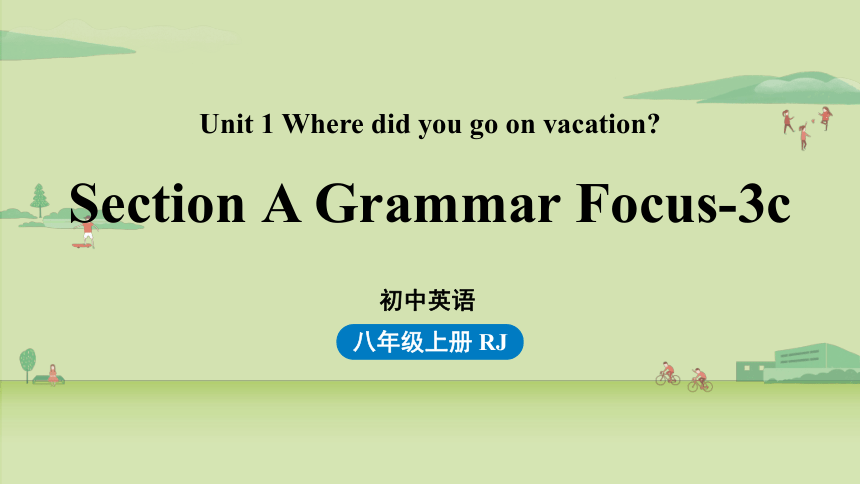 | |
| 格式 | zip | ||
| 文件大小 | 2.1MB | ||
| 资源类型 | 教案 | ||
| 版本资源 | 人教新目标(Go for it)版 | ||
| 科目 | 英语 | ||
| 更新时间 | 2023-02-15 15:35:39 | ||
图片预览

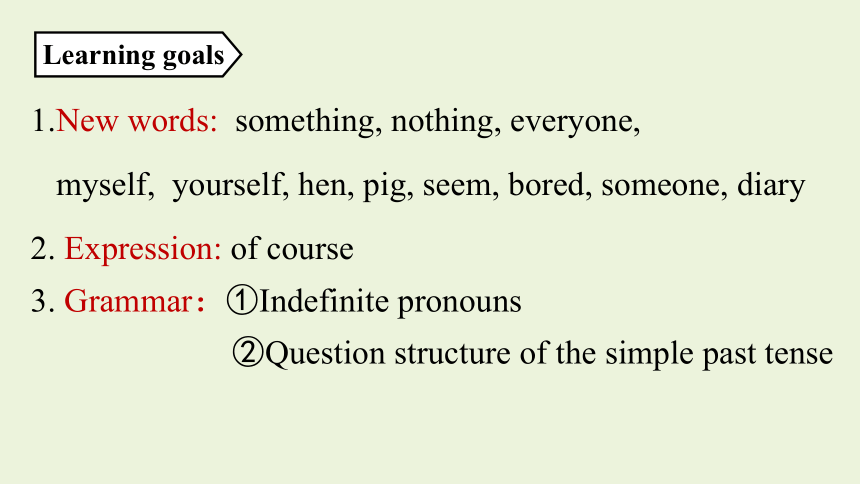
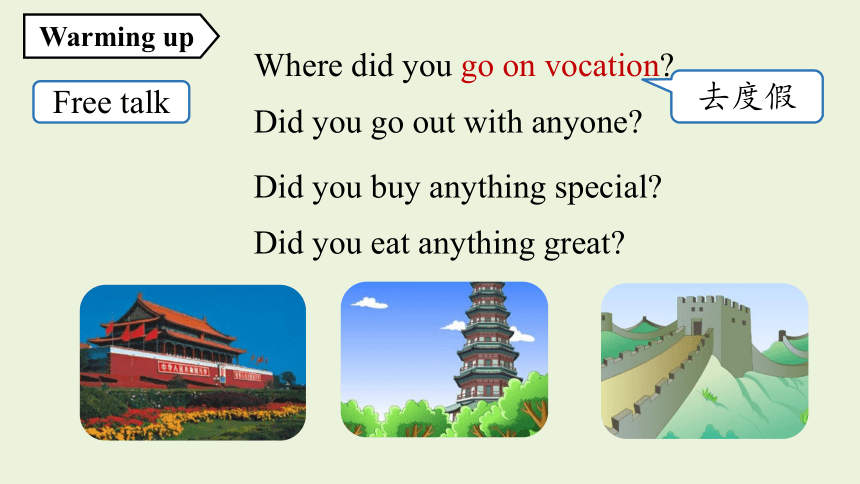
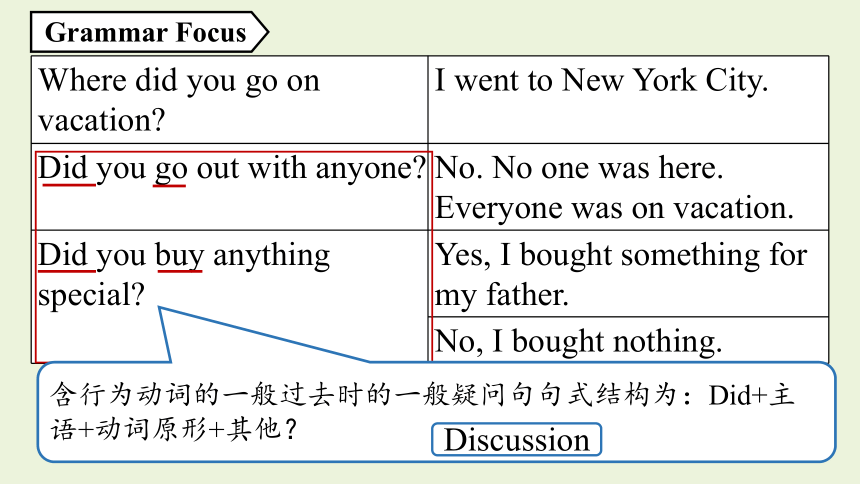
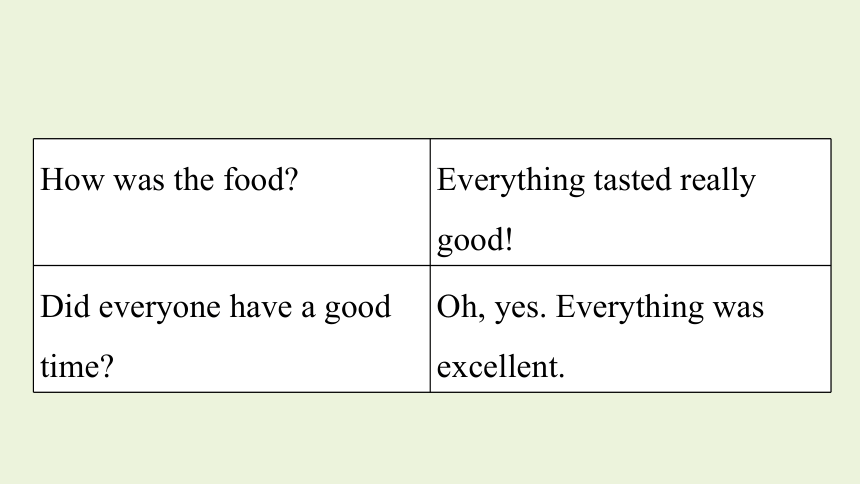
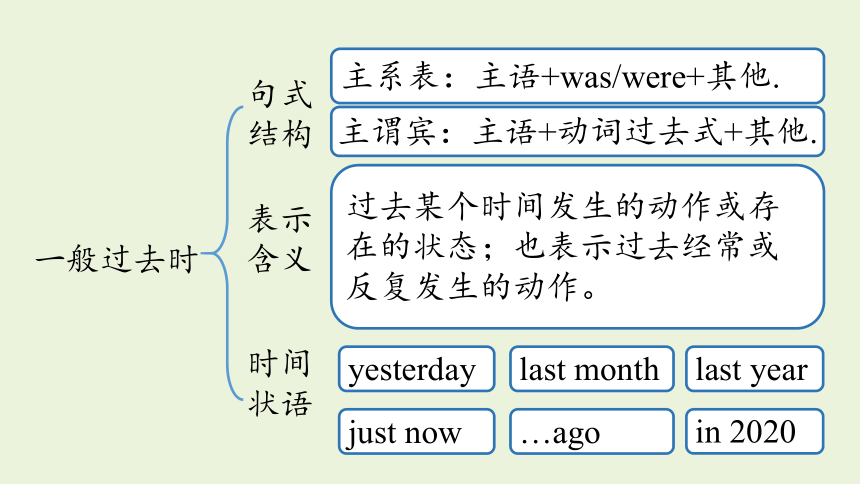
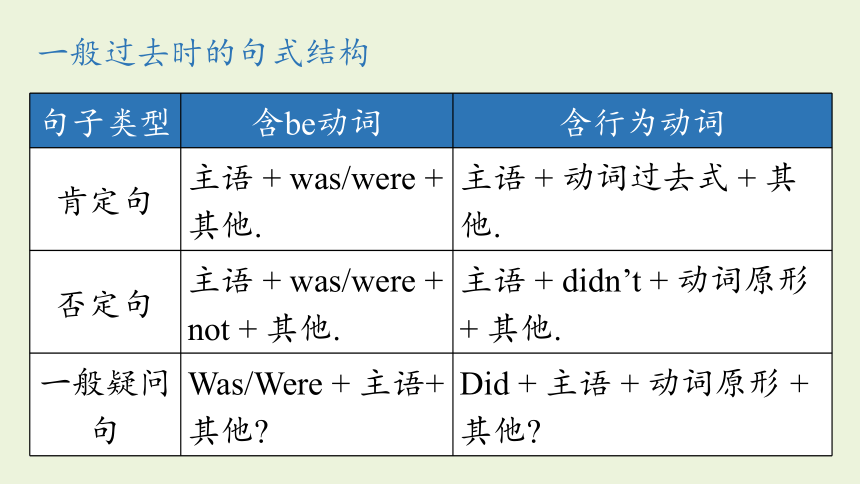
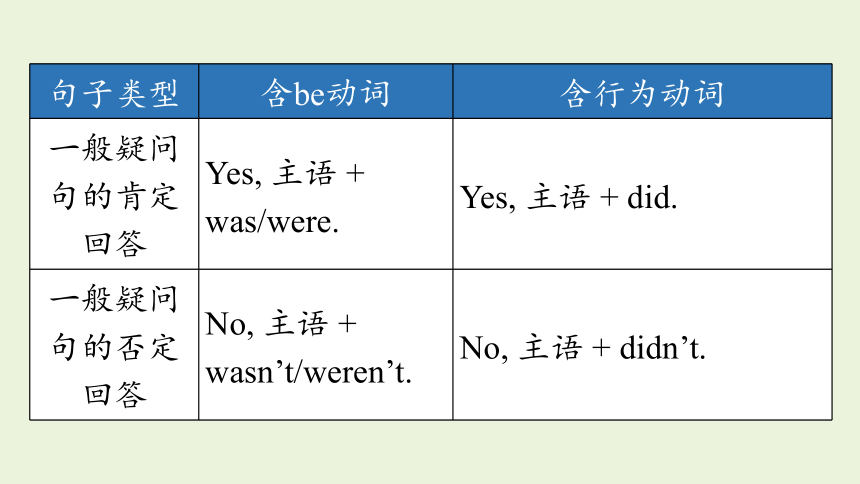
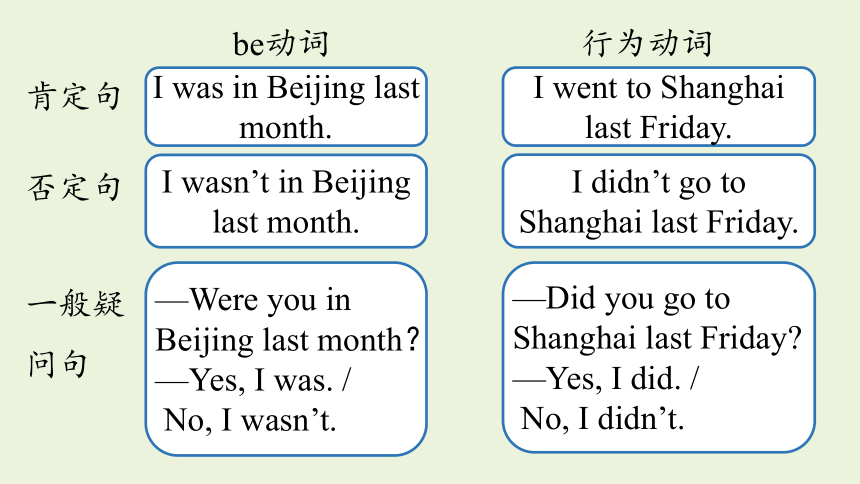
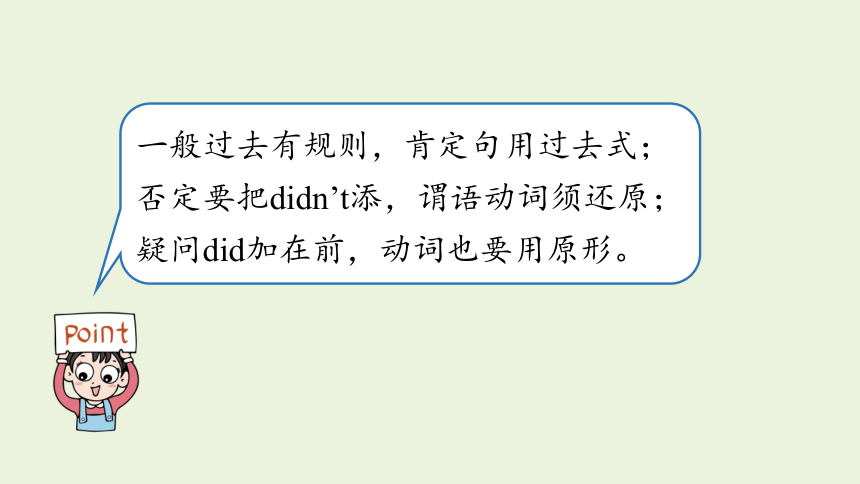
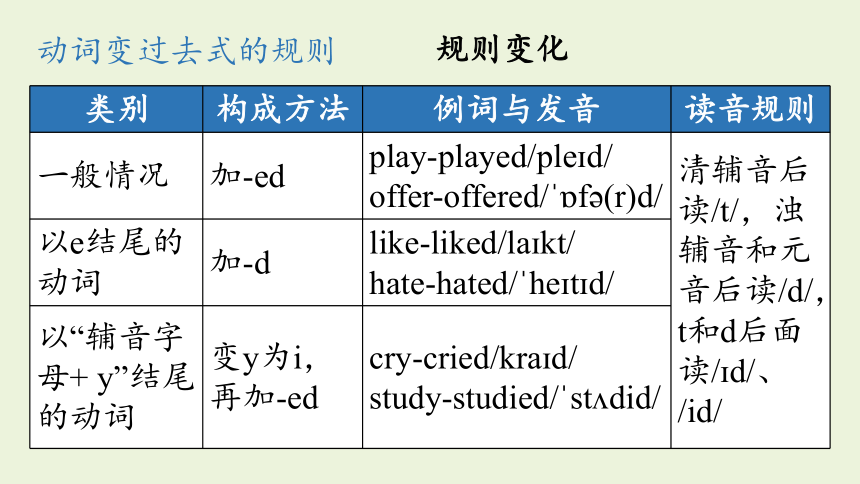
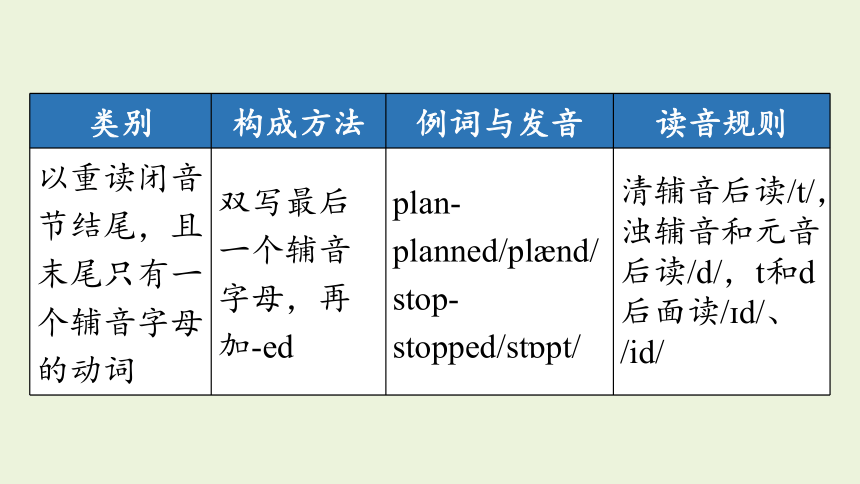
文档简介
(共46张PPT)
Section A Grammar Focus-3c
Unit 1 Where did you go on vacation
八年级上册 RJ
初中英语
1.New words: something, nothing, everyone,
myself, yourself, hen, pig, seem, bored, someone, diary
2. Expression: of course
3. Grammar:①Indefinite pronouns
②Question structure of the simple past tense
Learning goals
Where did you go on vocation
Did you go out with anyone
Did you buy anything special
Did you eat anything great
Free talk
Warming up
去度假
Where did you go on vacation I went to New York City.
Did you go out with anyone No. No one was here. Everyone was on vacation.
Did you buy anything special Yes, I bought something for my father.
No, I bought nothing.
含行为动词的一般过去时的一般疑问句句式结构为:Did+主语+动词原形+其他?
Discussion
Grammar Focus
How was the food Everything tasted really good!
Did everyone have a good time Oh, yes. Everything was excellent.
句式结构
表示含义
时间状语
主系表:主语+was/were+其他.
主谓宾:主语+动词过去式+其他.
过去某个时间发生的动作或存在的状态;也表示过去经常或反复发生的动作。
yesterday
last month
last year
just now
…ago
in 2020
一般过去时
句子类型 含be动词 含行为动词
肯定句 主语 + was/were + 其他. 主语 + 动词过去式 + 其他.
否定句 主语 + was/were + not + 其他. 主语 + didn’t + 动词原形 + 其他.
一般疑问句 Was/Were + 主语+其他 Did + 主语 + 动词原形 + 其他
一般过去时的句式结构
句子类型 含be动词 含行为动词
一般疑问句的肯定回答 Yes, 主语 + was/were. Yes, 主语 + did.
一般疑问句的否定回答 No, 主语 + wasn’t/weren’t. No, 主语 + didn’t.
I was in Beijing last month.
I went to Shanghai last Friday.
I wasn’t in Beijing last month.
I didn’t go to Shanghai last Friday.
—Were you in Beijing last month?
—Yes, I was. /
No, I wasn’t.
—Did you go to Shanghai last Friday
—Yes, I did. /
No, I didn’t.
肯定句
否定句
一般疑问句
be动词
行为动词
一般过去有规则,肯定句用过去式;
否定要把didn’t添,谓语动词须还原;
疑问did加在前,动词也要用原形。
规则变化
类别 构成方法 例词与发音 读音规则
一般情况 加-ed play-played/ple d/ offer-offered/ f (r)d/ 清辅音后读/t/,浊辅音和元音后读/d/,t和d后面
读/ d/、/id/
以e结尾的动词 加-d like-liked/la kt/ hate-hated/ he t d/ 以“辅音字母+ y”结尾的动词 变y为i,再加-ed cry-cried/kra d/ study-studied/ st did/ 动词变过去式的规则
类别 构成方法 例词与发音 读音规则
以重读闭音节结尾,且末尾只有一个辅音字母的动词 双写最后一个辅音字母,再加-ed plan-planned/pl nd/ stop-stopped/st pt/ 清辅音后读/t/,浊辅音和元音后读/d/,t和d后面读/ d/、
/id/
类别 例词
过去式和原形一样 cut-cut read-read put-put
中间元音字母变化 i-a swim-swam begin-began sit-sat
i-o ride-rode drive-drove write-wrote
以ow/aw结尾的词,把ow/aw变成ew draw-drew throw-threw blow-blew
结尾的d变为t build-built spend-spent lend-lent
不规则变化
类别 例词
过去式以o(a)ught 结尾 bring-brought teach-taught catch-caught
以n结尾的词,在词尾加t mean-meant burn-burnt learn-learnt
含有双写字母的词,将双写改为单写,在词尾加t feel-felt smell-smelt keep-kept
一般过去时的时间状语
yesterday, last month, last year, just now, ...ago
Where did you go on vacation I went to New York City.
Did you go out with anyone No. No one was here. Everyone was on vacation.
Did you buy anything special Yes, I bought something for my father.
No, I bought nothing.
Read silently
How was the food Everything tasted really good!
Did everyone have a good time Oh, yes. Everything was excellent.
Can you find the compound indefinite pronouns from this form How many can you find
Where did you go on vacation I went to New York City.
Did you go out with anyone No. No one was here. Everyone was on vacation.
Did you buy anything special Yes, I bought something for my father.
No, I bought nothing.
Circle the compound indefinite pronouns.
How was the food Everything tasted really good!
Did everyone have a good time Oh, yes. Everything was excellent.
For people For things
everyone
someone
nothing
anyone
something
anything
no one
everything
Classification
For people
everyone
someone
anyone
no one
any +one
任何人
every + one
每人;人人
no one (要分开)
没有人
some + one
某人
For things
nothing
something
anything
everything
some + thing
某事
every + thing
每件事,所有事
any + thing
任何事物
no + thing
没有什么
复合不定代词是由some、any、 no、every加上-body、
-one、-thing构成的不定代词。功能相当于名词,在句中可作主语、宾语或表语,不能作定语。
Someone is waiting for you.
有人在等你。
I have nothing to say.
我没什么可说的。
Her son is everything for her. 对她来说,儿子就是一切。
作主语
作宾语
作表语
some-类 any-类 no-类 every-类
-body somebody某人;有人 anybody 任何人 nobody 没有人 everybody
每人;人人;
所有人
-one someone 某人;有人 anyone 任何人 no one 没有人 everyone
每人;人人;
所有人
前
后
some-类 any-类 no-类 every-类
-thing something 某事;某物 anything 任何东西;任何事物 nothing 没有什么 everything
每件事;
所有事物;
一切
前
后
1.复合不定代词作主语时,谓语动词要用单数形式。
2.复合不定代词被定语(形容词、不定式、else等)修饰时,定语要后置。
复合不定代词的用法
Do you have anything to say
Everyone wants to have a long holiday.人人都想有一个长假期。
There is something important in today’s newspaper.
Ask someone else to help you.
3.some-类和any-类复合不定代词的用法区别
some-类复合不定代词 any-类复合不定代词
肯定句 常用于肯定句 若any-类复合不定代词用于肯定句时,表示“随便哪个”
疑问句 在表示请求并希望得到对方肯定回答的疑问句中,要用some-类复合不定代词 常用于疑问句中
some-类复合不定代词 any-类复合不定代词
否定句 常用于否定句中
例句 ①There is something wrong with my bike. ②Would you like something to drink ①Anybody can see that it’s wrong.
②Is there anyone at home
③The old lady couldn’t see anything at all.
复合不定代词
指人(以-one/-body结尾)
everybody (每个人)
someone (某人)
everyone (每个人)
anyone (任何人)
somebody (某人)
anybody (任何人)
no one (没有人)
nobody (没有人)
指物(以-thing结尾)
everything (一切事物)
anything (任何事物)
something (某事物)
nothing (没有什么)
复合代词要牢记,修饰成分后边放,
如若它来作主语,谓语单数没商量。
some-代词肯定句,any-代词否、疑忙,
若是希望得肯定,some-代词不相让。
anyone something anything everything nothing
Linda: Did you do _________ fun on your vacation, Alice
Alice: Yes, I did. I went to Sanya.
Linda: How did you like it
Alice: Well, it was my first time there, so __________ was really interesting.
Linda: Did you go with ________
anything
everything
anyone
Fill in the blanks with the words in the box and practice the conversation.
3a
Alice: Yes, I did. I went with my sister.
Linda: Did you go shopping
Alice: Of course! I bought __________ for my parents, but
_________ for myself.
Linda: Why didn’t you buy _________ for yourself
Alice: I didn’t really see__________ I liked.
something
nothing
anything
anything
anything everything nothing everyone no one
Dear Bill,
How was your vacation Did you do _________ interesting Did _________________ in the family go with you I went to a friend’s farm in the countryside with my family. ___________was great. We fed some hens and
anything
everyone/anyone
Everything
Fill in the blanks in the e-mail message with the words
in the box.
3b
saw some baby pigs. They were so cute! The only problem was that there was _________ much to do in the evening but read. Still ___________seemed to be bored. Bye for now!
Mark
nothing
no one
Where did Mark go on vacation
How was his vacation
What animal did they feed
What was the problem
Did anyone seem bored
Read the e-mail message with questions
Dear Bill,
How was your vacation Did you do anything interesting Did anyone in the family go with you I went to a friend’s farm in the countryside with my family. Everything was great. We fed some hens and saw some baby pigs. They were so cute! The only problem was that there was nothing much to do in the evening but read. Still no one seemed to be bored. Bye for now!
Mark
Read this e-mail message again and answer the above questions.
①
②
③
④
⑤
1. Yes, I bought something for my father.(教材P3Grammar Focus)
buy sth. for sb.为某人买某物(buy的过去式是bought)
buy sth. for sb.= buy sb. sth. (当sb. 和 sth.都为代词时,只能用buy sth. for sb.)
I bought a scarf for my mother on her birthday.
Language points
buy sth. for sb.为某人买某物
2. Everything tasted really good!(教材P3 Grammar Focus)
The two cheeses taste very different.
How does it taste like
taste在此处作连系动词,意为“尝起来;有······的味道”
后接形容词作表语,不用于进行时。
taste v. 有······的味道
Ask your group questions about their last vacation. Then tell the class your results.
Did you… Everyone Someone (write the classmate’s name) No one
eat anything at a restaurant
read anything interesting
3c
Did you… Everyone Someone (write the classmate’s name) No one
visit anyone in your family
buy anything
keep a diary
In our group, everyone ate something at a restaurant…
一、单项选择
1. (北京中考)David is a tennis player. He to play tennis when he was six years old.
A. begins B. will begin C. began D. has begun
2. (东营中考)There six countries in SCO(上合组织) at first, but now the number has increased to eight.
A.is B. are C. were D. will be
C
C
Exercises
3.(泰州中考)—Is there else in the classroom
—It’s empty. is listening to a speech in the school hall.
anyone; Anyone B. anyone; Everyone
C. everyone; Anyone D. everyone; Everyone
B
4.(黄冈中考)—Amazing! Tom got the best grade in the test last week.
— is impossible. He studies really hard online this term.
A. Anything B.Nothing C.Everything D.Something
5.(恩施州中考) —Sally, I have _____ exciting to tell you. We will go back to school soon.
—Great!
A.anything B.something C.everything
B
B
二、改错
1. I didn’t see someone in the theater. ( ) _________
2. Did you find funny anything in the book ( ) ______________
A B C
3. There are something wrong with my bike. ( ) ___
A B C
A B C
B
A 、B
A
anyone
anything funny
is
三、完成句子
1. 今天的报纸上没有什么有趣的东西。
There is in today’s newspaper.
2. 我有一些重要的事情要告诉汤姆。
I have to tell Tom.
3. 如果你想保持牙齿健康,你最好不要吃太多甜的
东西。
If you want to keep your teeth healthy, you'd better not eat __________ __________too much.
something important
nothing interesting
anything
sweet
Key words
Useful expressions
of course, buy sth. for sb.
Grammar
①Indefinite pronouns
②Question structure of the simple past tense
something, nothing,everyone, myself, yourself,
hen, pig, seem, bored, someone, diary,taste
Summary
Section A Grammar Focus-3c
Unit 1 Where did you go on vacation
八年级上册 RJ
初中英语
1.New words: something, nothing, everyone,
myself, yourself, hen, pig, seem, bored, someone, diary
2. Expression: of course
3. Grammar:①Indefinite pronouns
②Question structure of the simple past tense
Learning goals
Where did you go on vocation
Did you go out with anyone
Did you buy anything special
Did you eat anything great
Free talk
Warming up
去度假
Where did you go on vacation I went to New York City.
Did you go out with anyone No. No one was here. Everyone was on vacation.
Did you buy anything special Yes, I bought something for my father.
No, I bought nothing.
含行为动词的一般过去时的一般疑问句句式结构为:Did+主语+动词原形+其他?
Discussion
Grammar Focus
How was the food Everything tasted really good!
Did everyone have a good time Oh, yes. Everything was excellent.
句式结构
表示含义
时间状语
主系表:主语+was/were+其他.
主谓宾:主语+动词过去式+其他.
过去某个时间发生的动作或存在的状态;也表示过去经常或反复发生的动作。
yesterday
last month
last year
just now
…ago
in 2020
一般过去时
句子类型 含be动词 含行为动词
肯定句 主语 + was/were + 其他. 主语 + 动词过去式 + 其他.
否定句 主语 + was/were + not + 其他. 主语 + didn’t + 动词原形 + 其他.
一般疑问句 Was/Were + 主语+其他 Did + 主语 + 动词原形 + 其他
一般过去时的句式结构
句子类型 含be动词 含行为动词
一般疑问句的肯定回答 Yes, 主语 + was/were. Yes, 主语 + did.
一般疑问句的否定回答 No, 主语 + wasn’t/weren’t. No, 主语 + didn’t.
I was in Beijing last month.
I went to Shanghai last Friday.
I wasn’t in Beijing last month.
I didn’t go to Shanghai last Friday.
—Were you in Beijing last month?
—Yes, I was. /
No, I wasn’t.
—Did you go to Shanghai last Friday
—Yes, I did. /
No, I didn’t.
肯定句
否定句
一般疑问句
be动词
行为动词
一般过去有规则,肯定句用过去式;
否定要把didn’t添,谓语动词须还原;
疑问did加在前,动词也要用原形。
规则变化
类别 构成方法 例词与发音 读音规则
一般情况 加-ed play-played/ple d/ offer-offered/ f (r)d/ 清辅音后读/t/,浊辅音和元音后读/d/,t和d后面
读/ d/、/id/
以e结尾的动词 加-d like-liked/la kt/ hate-hated/ he t d/ 以“辅音字母+ y”结尾的动词 变y为i,再加-ed cry-cried/kra d/ study-studied/ st did/ 动词变过去式的规则
类别 构成方法 例词与发音 读音规则
以重读闭音节结尾,且末尾只有一个辅音字母的动词 双写最后一个辅音字母,再加-ed plan-planned/pl nd/ stop-stopped/st pt/ 清辅音后读/t/,浊辅音和元音后读/d/,t和d后面读/ d/、
/id/
类别 例词
过去式和原形一样 cut-cut read-read put-put
中间元音字母变化 i-a swim-swam begin-began sit-sat
i-o ride-rode drive-drove write-wrote
以ow/aw结尾的词,把ow/aw变成ew draw-drew throw-threw blow-blew
结尾的d变为t build-built spend-spent lend-lent
不规则变化
类别 例词
过去式以o(a)ught 结尾 bring-brought teach-taught catch-caught
以n结尾的词,在词尾加t mean-meant burn-burnt learn-learnt
含有双写字母的词,将双写改为单写,在词尾加t feel-felt smell-smelt keep-kept
一般过去时的时间状语
yesterday, last month, last year, just now, ...ago
Where did you go on vacation I went to New York City.
Did you go out with anyone No. No one was here. Everyone was on vacation.
Did you buy anything special Yes, I bought something for my father.
No, I bought nothing.
Read silently
How was the food Everything tasted really good!
Did everyone have a good time Oh, yes. Everything was excellent.
Can you find the compound indefinite pronouns from this form How many can you find
Where did you go on vacation I went to New York City.
Did you go out with anyone No. No one was here. Everyone was on vacation.
Did you buy anything special Yes, I bought something for my father.
No, I bought nothing.
Circle the compound indefinite pronouns.
How was the food Everything tasted really good!
Did everyone have a good time Oh, yes. Everything was excellent.
For people For things
everyone
someone
nothing
anyone
something
anything
no one
everything
Classification
For people
everyone
someone
anyone
no one
any +one
任何人
every + one
每人;人人
no one (要分开)
没有人
some + one
某人
For things
nothing
something
anything
everything
some + thing
某事
every + thing
每件事,所有事
any + thing
任何事物
no + thing
没有什么
复合不定代词是由some、any、 no、every加上-body、
-one、-thing构成的不定代词。功能相当于名词,在句中可作主语、宾语或表语,不能作定语。
Someone is waiting for you.
有人在等你。
I have nothing to say.
我没什么可说的。
Her son is everything for her. 对她来说,儿子就是一切。
作主语
作宾语
作表语
some-类 any-类 no-类 every-类
-body somebody某人;有人 anybody 任何人 nobody 没有人 everybody
每人;人人;
所有人
-one someone 某人;有人 anyone 任何人 no one 没有人 everyone
每人;人人;
所有人
前
后
some-类 any-类 no-类 every-类
-thing something 某事;某物 anything 任何东西;任何事物 nothing 没有什么 everything
每件事;
所有事物;
一切
前
后
1.复合不定代词作主语时,谓语动词要用单数形式。
2.复合不定代词被定语(形容词、不定式、else等)修饰时,定语要后置。
复合不定代词的用法
Do you have anything to say
Everyone wants to have a long holiday.人人都想有一个长假期。
There is something important in today’s newspaper.
Ask someone else to help you.
3.some-类和any-类复合不定代词的用法区别
some-类复合不定代词 any-类复合不定代词
肯定句 常用于肯定句 若any-类复合不定代词用于肯定句时,表示“随便哪个”
疑问句 在表示请求并希望得到对方肯定回答的疑问句中,要用some-类复合不定代词 常用于疑问句中
some-类复合不定代词 any-类复合不定代词
否定句 常用于否定句中
例句 ①There is something wrong with my bike. ②Would you like something to drink ①Anybody can see that it’s wrong.
②Is there anyone at home
③The old lady couldn’t see anything at all.
复合不定代词
指人(以-one/-body结尾)
everybody (每个人)
someone (某人)
everyone (每个人)
anyone (任何人)
somebody (某人)
anybody (任何人)
no one (没有人)
nobody (没有人)
指物(以-thing结尾)
everything (一切事物)
anything (任何事物)
something (某事物)
nothing (没有什么)
复合代词要牢记,修饰成分后边放,
如若它来作主语,谓语单数没商量。
some-代词肯定句,any-代词否、疑忙,
若是希望得肯定,some-代词不相让。
anyone something anything everything nothing
Linda: Did you do _________ fun on your vacation, Alice
Alice: Yes, I did. I went to Sanya.
Linda: How did you like it
Alice: Well, it was my first time there, so __________ was really interesting.
Linda: Did you go with ________
anything
everything
anyone
Fill in the blanks with the words in the box and practice the conversation.
3a
Alice: Yes, I did. I went with my sister.
Linda: Did you go shopping
Alice: Of course! I bought __________ for my parents, but
_________ for myself.
Linda: Why didn’t you buy _________ for yourself
Alice: I didn’t really see__________ I liked.
something
nothing
anything
anything
anything everything nothing everyone no one
Dear Bill,
How was your vacation Did you do _________ interesting Did _________________ in the family go with you I went to a friend’s farm in the countryside with my family. ___________was great. We fed some hens and
anything
everyone/anyone
Everything
Fill in the blanks in the e-mail message with the words
in the box.
3b
saw some baby pigs. They were so cute! The only problem was that there was _________ much to do in the evening but read. Still ___________seemed to be bored. Bye for now!
Mark
nothing
no one
Where did Mark go on vacation
How was his vacation
What animal did they feed
What was the problem
Did anyone seem bored
Read the e-mail message with questions
Dear Bill,
How was your vacation Did you do anything interesting Did anyone in the family go with you I went to a friend’s farm in the countryside with my family. Everything was great. We fed some hens and saw some baby pigs. They were so cute! The only problem was that there was nothing much to do in the evening but read. Still no one seemed to be bored. Bye for now!
Mark
Read this e-mail message again and answer the above questions.
①
②
③
④
⑤
1. Yes, I bought something for my father.(教材P3Grammar Focus)
buy sth. for sb.为某人买某物(buy的过去式是bought)
buy sth. for sb.= buy sb. sth. (当sb. 和 sth.都为代词时,只能用buy sth. for sb.)
I bought a scarf for my mother on her birthday.
Language points
buy sth. for sb.为某人买某物
2. Everything tasted really good!(教材P3 Grammar Focus)
The two cheeses taste very different.
How does it taste like
taste在此处作连系动词,意为“尝起来;有······的味道”
后接形容词作表语,不用于进行时。
taste v. 有······的味道
Ask your group questions about their last vacation. Then tell the class your results.
Did you… Everyone Someone (write the classmate’s name) No one
eat anything at a restaurant
read anything interesting
3c
Did you… Everyone Someone (write the classmate’s name) No one
visit anyone in your family
buy anything
keep a diary
In our group, everyone ate something at a restaurant…
一、单项选择
1. (北京中考)David is a tennis player. He to play tennis when he was six years old.
A. begins B. will begin C. began D. has begun
2. (东营中考)There six countries in SCO(上合组织) at first, but now the number has increased to eight.
A.is B. are C. were D. will be
C
C
Exercises
3.(泰州中考)—Is there else in the classroom
—It’s empty. is listening to a speech in the school hall.
anyone; Anyone B. anyone; Everyone
C. everyone; Anyone D. everyone; Everyone
B
4.(黄冈中考)—Amazing! Tom got the best grade in the test last week.
— is impossible. He studies really hard online this term.
A. Anything B.Nothing C.Everything D.Something
5.(恩施州中考) —Sally, I have _____ exciting to tell you. We will go back to school soon.
—Great!
A.anything B.something C.everything
B
B
二、改错
1. I didn’t see someone in the theater. ( ) _________
2. Did you find funny anything in the book ( ) ______________
A B C
3. There are something wrong with my bike. ( ) ___
A B C
A B C
B
A 、B
A
anyone
anything funny
is
三、完成句子
1. 今天的报纸上没有什么有趣的东西。
There is in today’s newspaper.
2. 我有一些重要的事情要告诉汤姆。
I have to tell Tom.
3. 如果你想保持牙齿健康,你最好不要吃太多甜的
东西。
If you want to keep your teeth healthy, you'd better not eat __________ __________too much.
something important
nothing interesting
anything
sweet
Key words
Useful expressions
of course, buy sth. for sb.
Grammar
①Indefinite pronouns
②Question structure of the simple past tense
something, nothing,everyone, myself, yourself,
hen, pig, seem, bored, someone, diary,taste
Summary
同课章节目录
- Unit 1 Where did you go on vacation?
- Section A
- Section B
- Unit 2 How often do you exercise?
- Section A
- Section B
- Unit 3 I'm more outgoing than my sister.
- Section A
- Section B
- Unit 4 What's the best movie theater?
- Section A
- Section B
- Unit 5 Do you want to watch a game show?
- Section A
- Section B
- Unit 6 I'm going to study computer science.
- Section A
- Section B
- Unit 7 Will people have robots?
- Section A
- Section B
- Unit 8 How do you make a banana milk shake?
- Section A
- Section B
- Unit 9 Can you come to my party?
- Section A
- Section B
- Unit 10 If you go to the party, you'll have a grea
- Section A
- Section B
